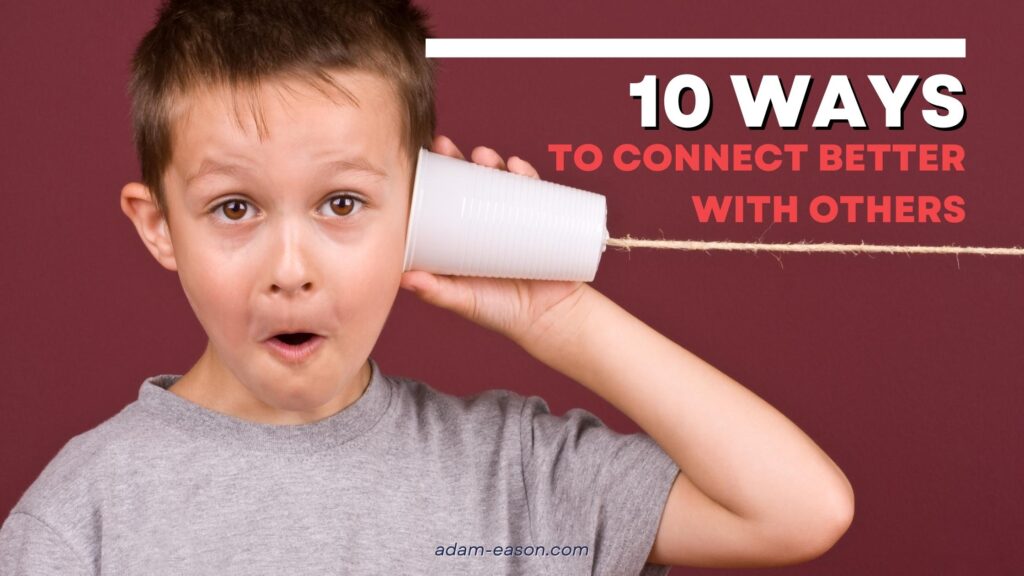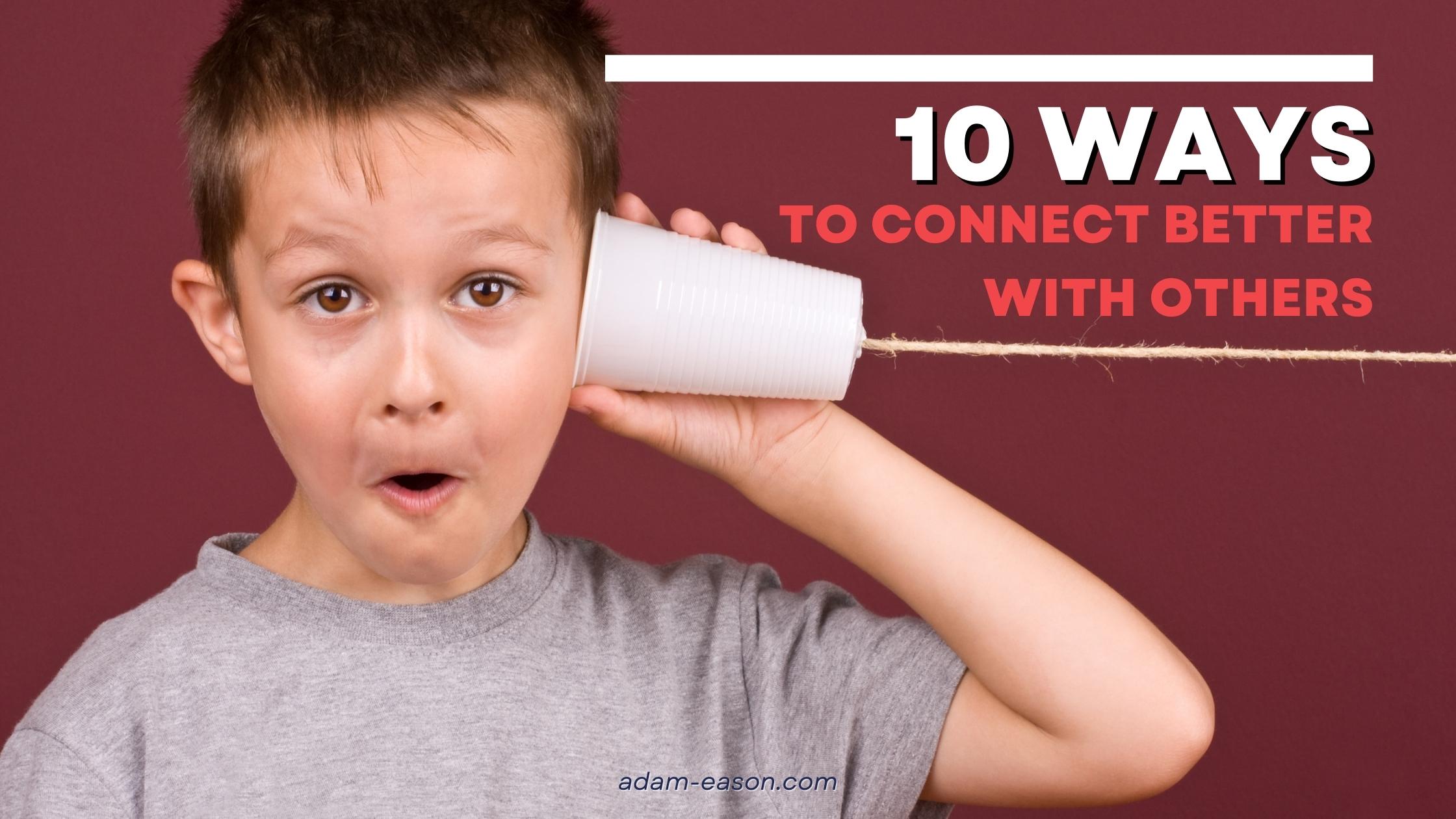
5 Proven Ways to Connect with Others and Build Meaningful Relationships
In today’s increasingly digital world, genuine human connection can feel elusive. While technology offers unprecedented opportunities for communication, it can also contribute to feelings of isolation and disconnect. Learning how to effectively connect with others is crucial for our mental, emotional, and even physical well-being. Meaningful relationships provide support, reduce stress, and enhance our overall quality of life. This article explores five practical and proven ways to foster deeper connections with the people around you, whether they are family, friends, colleagues, or even acquaintances. It’s about actively seeking opportunities to connect with others, going beyond superficial interactions, and building bonds based on mutual understanding and respect. Let’s dive into these strategies and discover how you can enrich your life through stronger interpersonal relationships.
Actively Listen and Show Genuine Interest
One of the most fundamental ways to connect with others is through active listening. This goes beyond simply hearing the words someone is saying; it involves fully engaging with the speaker, paying attention to their body language, and demonstrating genuine interest in their thoughts and feelings. When someone feels truly heard and understood, it creates a sense of validation and strengthens the bond between you.
Here are some key elements of active listening:
- Pay Attention: Minimize distractions, make eye contact, and focus solely on the speaker.
- Show That You’re Listening: Use verbal cues like “I see,” “Tell me more,” and nonverbal cues like nodding and smiling to indicate that you’re engaged.
- Provide Feedback: Paraphrase what the speaker is saying to ensure you understand correctly. For example, “So, if I understand you correctly, you’re saying that…”
- Defer Judgment: Avoid interrupting or formulating a response while the speaker is still talking. Focus on understanding their perspective, even if you don’t agree with it.
- Respond Appropriately: Offer thoughtful and relevant responses that show you’ve been listening and that you care about what the speaker has to say.
Showing genuine interest involves asking open-ended questions that encourage the other person to elaborate. Instead of asking questions that can be answered with a simple yes or no, try questions like, “What was the most challenging part of that experience?” or “How did that make you feel?” This demonstrates that you’re genuinely interested in their perspective and encourages them to open up.
By actively listening and showing genuine interest, you create a safe and supportive space for meaningful conversation and deeper connect with others.
Find Common Ground and Shared Interests
Another effective way to connect with others is by finding common ground and shared interests. This can be anything from a shared hobby or passion to a similar life experience or value. When you discover something you have in common with someone, it creates a sense of connection and belonging.
Here are some ways to identify shared interests:
- Ask Questions: Get to know the other person by asking about their hobbies, interests, and passions.
- Listen Carefully: Pay attention to what the other person says and look for clues that might indicate shared interests.
- Share Your Own Interests: Talk about your own hobbies and passions, and see if the other person expresses any interest or enthusiasm.
- Observe Your Surroundings: Look for shared interests in your environment. For example, if you’re at a sporting event, you likely share an interest in sports with the other attendees.
- Utilize Social Media: Check out their social media profiles (if appropriate) to get a better sense of their interests and activities.
Once you’ve identified a shared interest, use it as a springboard for conversation and connection. Talk about your experiences with that interest, share tips and resources, or even plan an activity together. For example, if you both enjoy hiking, you could suggest going on a hike together. [See also: Benefits of Hiking]
Finding common ground helps to break down barriers and create a sense of camaraderie. It allows you to connect with others on a deeper level and build relationships based on shared experiences and values.
Practice Empathy and Understanding
Empathy is the ability to understand and share the feelings of another person. It’s about putting yourself in their shoes and seeing the world from their perspective. Practicing empathy is essential for building strong and meaningful relationships. When you demonstrate empathy, you show that you care about the other person’s feelings and that you’re willing to support them through difficult times.
Here are some ways to practice empathy:
- Listen Actively: Pay attention to the other person’s words, body language, and tone of voice to get a sense of their emotional state.
- Ask Questions: Ask clarifying questions to ensure you understand their perspective.
- Validate Their Feelings: Acknowledge and validate their feelings, even if you don’t necessarily agree with them. For example, you could say, “I can understand why you’re feeling frustrated” or “That sounds really difficult.”
- Offer Support: Offer practical and emotional support. Let the other person know that you’re there for them and that you’re willing to help in any way you can.
- Avoid Judgment: Refrain from judging or criticizing the other person’s feelings or experiences.
Empathy involves understanding that everyone experiences the world differently. What might seem trivial to you could be deeply meaningful to someone else. By practicing empathy, you can connect with others on a deeper level and build relationships based on mutual understanding and compassion.
Be Vulnerable and Share Your Own Experiences
Vulnerability is the willingness to show your true self to others, including your imperfections and vulnerabilities. While it can be scary to be vulnerable, it’s also essential for building trust and intimacy in relationships. When you’re willing to share your own experiences and feelings, it encourages others to do the same. This creates a sense of connection and authenticity.
Here are some ways to be more vulnerable:
- Share Your Stories: Talk about your own experiences, both positive and negative.
- Express Your Feelings: Be open and honest about your emotions.
- Admit Your Mistakes: Acknowledge your imperfections and admit when you’ve made a mistake.
- Ask for Help: Don’t be afraid to ask for help when you need it.
- Be Authentic: Be true to yourself and avoid trying to be someone you’re not.
It’s important to note that vulnerability should be reciprocal. Don’t overshare or reveal too much too soon. Start by sharing small things and gradually build trust over time. Also, be mindful of the other person’s comfort level and avoid pressuring them to share more than they’re comfortable with. [See also: Building Trust in Relationships]
By being vulnerable and sharing your own experiences, you create a space for authentic connection and deeper connect with others.
Stay Connected and Nurture Your Relationships
Building strong relationships is an ongoing process. It requires consistent effort and attention. Once you’ve established a connection with someone, it’s important to stay connected and nurture the relationship over time. This involves making an effort to stay in touch, spending quality time together, and showing that you care.
Here are some ways to stay connected and nurture your relationships:
- Make Time: Schedule regular time to spend with the people you care about.
- Stay in Touch: Use a variety of communication methods to stay in touch, such as phone calls, text messages, emails, and social media.
- Plan Activities: Plan activities together that you both enjoy.
- Offer Support: Offer practical and emotional support during difficult times.
- Show Appreciation: Express your gratitude and appreciation for the people in your life.
Nurturing relationships also involves being proactive and addressing any issues or conflicts that arise. Open and honest communication is essential for resolving conflicts and maintaining healthy relationships. It’s important to be willing to listen to the other person’s perspective, compromise, and find solutions that work for both of you.
By staying connected and nurturing your relationships, you can strengthen the bonds between you and create a network of support that will enrich your life for years to come. Learning how to connect with others is a lifelong journey, and the rewards are immeasurable.
Conclusion
In conclusion, learning how to connect with others is a vital skill that can significantly improve your overall well-being and quality of life. By actively listening, finding common ground, practicing empathy, being vulnerable, and staying connected, you can build meaningful relationships that provide support, reduce stress, and enhance your sense of belonging. Make a conscious effort to implement these strategies in your daily interactions, and you’ll be well on your way to fostering deeper and more fulfilling connections with the people around you. Remember, genuine connection is a two-way street, so be willing to invest time and effort in nurturing your relationships. The rewards are well worth it.

